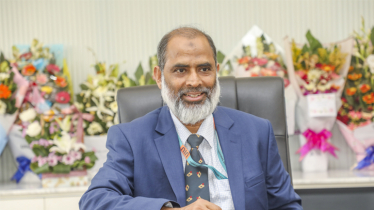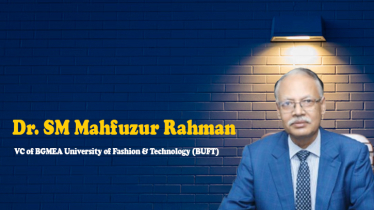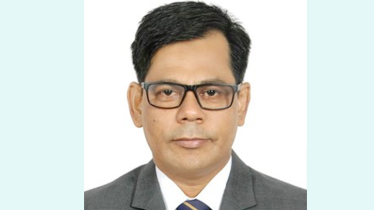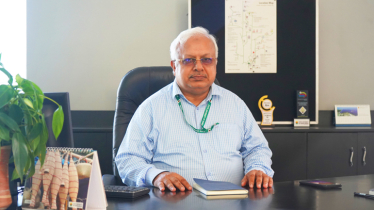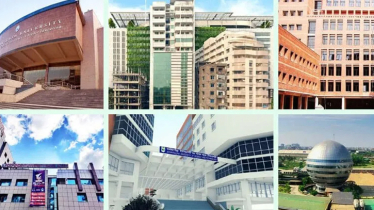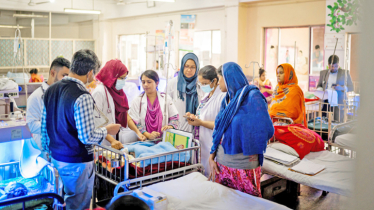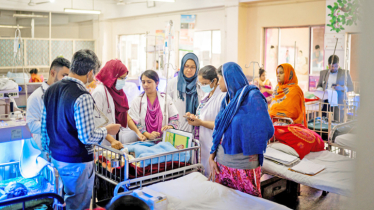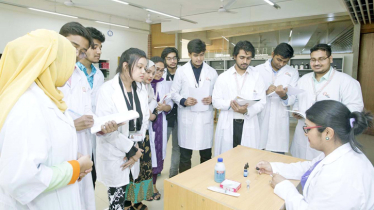
Photo : Messenger
Bangladesh is galloping towards a trillion-dollar economy to be included as the 16th trillion-dollar nation. Based on my calculation, GDP will get doubled in next 12 years by 2035. Returns will increase more than 10%. Bangladesh has already experienced a robust economic growth, with an average GDP growth rate above 6% per year for about 15 years in a row. The country's GDP has become more than doubled during this period holding consistency among the fastest-growing economies in the world. It has a developing market-based economy, with a focus on agriculture, garments and textiles, pharmaceuticals, shipbuilding, and services. Currently ranked 41st in global economy, Bangladesh aspires to reach 16th position by 2035. With a vision to stand as an “Upper Middle Income Country” in next decade and a “Developed Country by 2041 Bangladesh is now aiming to achieve a “Smart Bangladesh.” As a result, Bangladesh is likely to be welcomed by larger economic blocks like BRICS. Of course, Bangladesh and India will continue to shape the future of Indo-Pacific region together.
Goldman Sachs reports that the GDP of Bangladesh will increase to 6.3 trillion dollars in 2075. The economy of Bangladesh will surpass Saudi Arabia, Canada, Australia, Turkey, Italy, Malaysia and South Korea. Bangladesh was the wealthiest part of the subcontinent when East India Company invaded India and now Bangladesh’s amazing momentum will make her the wealthiest part of the subcontinent once again. Bangladesh is poised to reclaim its wealthiest status ($3023 compared to India $3011) in 2025, coming to a full circle in 266 years.
With risk aspects, Bangladesh’s challenges are decreasing due to economic momentum in industrial and service manufacturing sector, agricultural sector, physical and electronic infrastructure, financial sophistication and services, fair fiscal policy, education, health, expatriates’ relations, connectivity across Indo-Pacific region, cross-border logistics-communication, climate, and renewable energy areas among others. To name a few, efficient factors like demographic dividend, expanded infrastructure, incentive fiscal policy for direct foreign investments, rapid changes in banking and financial technology, Fintech business models, expedited remittances from expatriates, adoption of digital services etc. are working as catalysts behind large developments taken places.
We have 45% younger population, aged below 24 and 70% aged below 40 with a literacy rate of 74.70% compared to global average of 86.3%. 2.3 million Young professionals enter to the workforce every year with flexible cost of labor. Bangladesh has made substantial investments in infrastructure development, including transportation, energy (nuclear, wind) and communication. The construction of roads, bridges, and ports has improved connectivity and trade facilitation within the country and across the region. Belt and Roadway Initiative (BRI) construction will connect Bangladesh with the other countries of the region. It becomes a strategic hub linking India, China and ASEAN countries. Bangladesh is about to become South Asia’s largest outsource hub by 2026.
Saudi Arabia has recently announced plans to invest $1.2 billion to develop its primary port, on the other hand a Denmark based investment firm has recently grabbed the opportunity with $1.3b investments in 500MW offshore wind farm at the Bay of Bengal in Bangladesh and, just recently, Cox’s Bazar wind plant has spread its wings in commercial area. The financial technology (Fintech) industry is currently experiencing a significant transition in both its technological advancements and business models. Fintech brings sophistication and efficiency in investments introducing fluid payment system, mobile payments, increasing economic resilience. Bangladesh has made significant strides in adopting digital financial services. The government has also initiated various programs to promote the growth of the Fintech sector, recognizing its potential to improve financial inclusion and economic growth and foreign remittances. As Bangladesh is a major recipient of remittances, with millions of people relying on money sent from overseas to support their families.
FinTech and Blockchain technology can make remittances faster, cheaper, and more secure. Hayek the biggest free market proponent of the modern times rightly said, “Financial markets are the only legitimate, reliably welfare-enhancing foundation for a stable social order and economic progress.” Financial innovations are already obtaining sustainable solutions across the entire financial system. According to UNEP (2018), AI could lift global GDP by US$15-20 trillion by 2030. To that end my team and I launched FinTech Hub in Bangladesh to help investors take advantage of innovative resources to become next Unicorn. It is an one stop place where entrepreneurs under the age of 25, Fintech coaches and funders unleash innovative and creative forces to smooth financial services with an idea of human rights and the common good. Investors not only generate financial returns but also contribute to creating a more equitable and sustainable world. Bangladesh has made notable strides in promoting gender equality and women's empowerment.
It has made remarkable progress in the last 20 years in improving the lives of women and girls. The maternal mortality rate has decreased at more than two-thirds since 2000 and continues to fall. The fertility rate is declining and there is greater gender parity in school enrollment. Participation in the labour force has increased, and they have gained greater access to education and healthcare. The country has also taken steps to combat against gender-based violence and discrimination. The country has witnessed rapid growth in the information technology and telecommunications sectors. Internet and mobile phone penetration rates have increased significantly, leading to an improved connectivity and access to digital services. It is quickly becoming a regional leader in digital financial service sector. Elon Musk’s SPACEX is getting connected to Bangladesh’s ICT area. We have 47.61 million internet users & 45 million active social media users. There remains more works to do.
Bangladesh has made significant progress improving access to education and increasing literacy rates. Net enrollment rates at the primary level have reached almost 100%, and the country has achieved gender parity in primary and secondary education. The number of tertiary education institutions has also increased significantly. Along with education, Bangladesh has achieved substantial improvements in healthcare and nutrition. The country has seen a decline in infant and child mortality rates, along with increased access to healthcare services and immunization. It has successfully reduced poverty rates over the years. The poverty rate has roughly decreased to half of 20% over the last 15 years. However, challenges remain, including ensuring quality education and healthcare services for all citizens.
The Human Development Index (HDI) is an indicator of overall well-being, including education, healthcare, and income. Bangladesh has shown progress in improving its HDI, with increased life expectancy, literacy rates, and per capita income. Bangladesh has been focusing on inclusive growth by investing in rural development, microfinance initiatives, and social safety nets. Efforts have been given to provide financial services to the unbanked population and to improve access to credit for small and medium-sized enterprises (SMEs). However, there is much work to be done in this area. Under present government Bangladesh has established a stable path towards progress. In public sectors of governance, Bangladesh faces issues related to corruption and bureaucracy. We have inefficiency in effective delivery service.
Decentralized efforts have been made to strengthen local governance in Bangladesh. However, challenges such as capacity building, resource constraints hinder the effectiveness of local government institutions. In corporate governance, Bangladesh has regulations and guidelines in place to govern corporate behavior, including the Company Act and Securities and Exchange Commission (SEC) regulations. However, enforcement and compliance mechanisms need strengthening to ensure effective corporate governance practices. However, the role of boards of directors in ensuring transparency, accountability, and ethical conduct within companies is essential. Improving board independence, diversity, and effectiveness is crucial for enhancing corporate governance standards to protect the shareholders’ rights. Corporate governance can significantly help in human development initiatives. Improving education, healthcare, social services, and environmental improvement is critical for human development in Bangladesh. Investments in education and skills development are essential to empower the workforce and reduce poverty so are the social services and environmental sustainability. Balancing economic growth with environmental sustainability is crucial for long-term development.
Bangladesh has challenges to overcome such as climate change, natural resource depletion, and environmental degradation, which require integrated approaches to sustainable development through public private partnership. In all these areas, corporate boards need to invest in business-models focusing on ESG (environmental, social and governance) factors. The DNA of investment activities would instruct and prioritize projects and companies that not only aim for profit but also contribute to human rights. This could involve investing to companies that promote fair labour practices, environmental sustainability, social justice, and community development, among other criteria. This will go a long way to elevate economic and human development. By aligning investment activities with principles of human rights investors can not only generate financial returns but also contribute to creating a more equitable and sustainable world. This approach reflects a growing recognition among investors that financial success should not come at the expense of social and environmental well-being.
The writer is Professor of Finance, Saint Xavier University, Chicago, IL, USA
Messenger/Disha

